Propagandists
Abu Izzadeen is an Islamist propagandist and radical cleric who has been imprisoned in the United Kingdom for inciting and fundraising for terrorismDuncan Gardham, “Muslim preacher Abu Izzadeen guilty of inciting terrorism,” Telegraph (London), April 17, 2008, http://www.telegraph.co.uk/news/uknews/1895959/Muslim-preacher-Abu-Izzadeen-guilty-of-inciting-terrorism.html;
“Six guilty of terrorism support,” BBC News, April 17, 2008, http://news.bbc.co.uk/2/hi/uk_news/7352969.stm. and for association with radical Islamist groups Al Ghurabaa and al-Muhajiroun.“Profile: Abu Izzadeen,” BBC News, August 17, 2008, http://news.bbc.co.uk/2/hi/uk_news/7353136.stm; Murray Wardrop, “Islamic hate preacher arrested on terrorism charge,” Telegraph (London), November 3, 2011, http://www.telegraph.co.uk/news/uknews/terrorism-in-the-uk/8865616/Islamic-hate-preacher-arrested-on-terrorism-charge.html. Izzadeen has also used Twitter to praise ISISAbu Izzadeen, Twitter post, May 8, 2015, 2:47 p.m., https://twitter.com/AbuIzzadin/status/596748279146242048. and well-known jihadists such as Abu RumaysahAbu Izzadeen, Twitter post, April 25, 2015, 10:08 a.m., https://twitter.com/AbuIzzadin/status/591966948075900928. and Omar Bakri Muhammad.Abu Izzadeen, Twitter post, April 24, 2015, 12:50 p.m., https://twitter.com/AbuIzzadin/status/591645282280013824. Izzadeen was arrested in November 2015 aboard a Romania-bound train with convicted terrorist Simon Keeler. Steph Cockroft and Tom Wyke, “British extremists appear in court surrounded by machinegun-toting guards after they were caught in Hungary despite being banned from leaving the UK,” Daily Mail (London), November 19, 2015, http://www.dailymail.co.uk/news/article-3325459/British-extremists-appear-court-surrounded-machinegun-toting-guards-caught-Hungary-despite-banned-leaving-UK.html. A Hungarian court deported them both back to the United Kingdom later that month,“Hungary to deport Britons convicted of financing terror,” Associated Press, November 19, 2015, http://bigstory.ap.org/article/31dd544336e249f489b2b750ed7d0c53/hungary-deport-briton-convicted-financing-terror. and a British court sentenced Izzadeen to two years in prison in January 2016.Tim Lamden and Euan McLelland, “Revealed: How at least FIVE more British Islamic extremists with links to Jihadi Sid have slipped out of the UK in the past 20 months despite being on bail or subject to travel bans,” Daily Mail (London), January 6, 2016, http://www.dailymail.co.uk/news/article-3388028/Jihadi-Sid-fled-Britain-prompting-crackdown-bail-terror-suspectses.html;
Jamie McKinnell, “Islamic extremists jailed for "serious and deliberate" breach of counter-terrorism restrictions,” Mirror (London), January 8, 2016, http://www.mirror.co.uk/news/uk-news/islamic-extremists-jailed-serious-deliberate-7142974. Izzadeen was released in December 2017.Dipesh Gadher, “Release of hate preacher Anjem Choudary sparks fears of terrorist supergroup,” Times (London), September 23, 2018, https://www.thetimes.co.uk/article/release-of-hate-preacher-anjem-choudary-sparks-fears-of-terrorist-supergroup-vn9tzsnqs.
Born Trevor BrooksRoxanne Escobales, “Q&A: Abu Izzadeen,” Guardian (London), April 18, 2015, http://www.theguardian.com/uk/2008/apr/18/uksecurity2., Izzadeen is a Muslim convert of Jamaican descent. Izzadeen’s parents came to the United Kingdom in the 1960s and he converted to Islam at age 17.“Profile: Abu Izzadeen,” BBC News, August 17, 2008, http://news.bbc.co.uk/2/hi/uk_news/7353136.stm. Izzadeen reportedly radicalized in the 1990s after meeting Bakri Muhammad at the Finsbury Park Mosque.Duncan Gardham, “Muslim preacher Abu Izzadeen guilty of inciting terrorism,” Telegraph (London), April 17, 2008, http://www.telegraph.co.uk/news/uknews/1895959/Muslim-preacher-Abu-Izzadeen-guilty-of-inciting-terrorism.html. He then became a bodyguard for Bakri Muhammad and an enforcer for Bakri Muhammad and Anjem Choudary’s al-Muhajiroun organization, which disbanded in 2004 ahead of a U.K. ban.Murray Wardrop, “Islamic hate preacher arrested on terrorism charge,” Telegraph (London), November 3, 2011, http://www.telegraph.co.uk/news/uknews/terrorism-in-the-uk/8865616/Islamic-hate-preacher-arrested-on-terrorism-charge.html; Angela Rabasa and Cheryl Benard, Eurojihad, (Cambridge University Press, 2014), 54. Izzadeen became a primary spokesman for Al Ghurabaa, which was founded by some of Bakri Muhammad’s followers as a successor organization to al-Muhajiroun.“Profile: Abu Izzadeen,” BBC News, August 17, 2008, http://news.bbc.co.uk/2/hi/uk_news/7353136.stm. Following the July 7, 2005, terrorist bombings in London, Izzadeen called the bombings “mujahedeen activity” to “make people wake up and smell the coffee.”Alan Cowell, “Zambia Deports Terror Suspect Sought in U.S.; Britain Files Formal Charges in Attacks,” New York Times, August 8, 2005, http://www.nytimes.com/2005/08/08/world/europe/zambia-deports-terror-suspect-sought-in-us-britain-files-formal-charges-in-attacks.html.
In November 2004, Izzadeen led a group of radicals in storming the Regents Park Mosque in London. Izzadeen then called for Muslims to fight British and U.S. troops in Iraq and give money to terrorist causes.Roxanne Escobales, “Q&A: Abu Izzadeen,” Guardian (London), April 18, 2015, http://www.theguardian.com/uk/2008/apr/18/uksecurity2. Izzadeen also asserted that anybody who helps the Americans in Iraq should be killed. British prosecutors later convicted Izzadeen for encouraging terrorism during his speeches at the mosque.Duncan Gardham, “Muslim preacher Abu Izzadeen guilty of inciting terrorism,” Telegraph (London), April 17, 2008, http://www.telegraph.co.uk/news/uknews/1895959/Muslim-preacher-Abu-Izzadeen-guilty-of-inciting-terrorism.html;
“Six guilty of terrorism support,” BBC News, April 17, 2008, http://news.bbc.co.uk/2/hi/uk_news/7352969.stm. He was released with restriction in 2009,“Radical preacher back in prison,” BBC News, July 7, 2009, http://news.bbc.co.uk/2/hi/uk_news/8138312.stm; Dominic Casciani, “Radical preacher released early,” BBC News, May 6, 2009, http://news.bbc.co.uk/2/hi/uk_news/8035827.stm. but he has been in and out of jail since for violating the terms of his release.“Preacher with links to Islamist firebrand Anjem Choudary hit with travel ban over terror risk,” Daily Mail (London), April 11, 2015, http://www.dailymail.co.uk/news/article-3035134/Preacher-links-Islamist-firebrand-Anjem-Choudary-hit-travel-ban-terror-risk.html. On January 6, 2016, he was sentenced to two years in prison for violating the terms of his release by traveling abroad.Tim Lamden and Euan McLelland, “Revealed: How at least FIVE more British Islamic extremists with links to Jihadi Sid have slipped out of the UK in the past 20 months despite being on bail or subject to travel bans,” Daily Mail (London), January 6, 2016, http://www.dailymail.co.uk/news/article-3388028/Jihadi-Sid-fled-Britain-prompting-crackdown-bail-terror-suspectses.html;
Jamie McKinnell, “Islamic extremists jailed for "serious and deliberate" breach of counter-terrorism restrictions,” Mirror (London), January 8, 2016, http://www.mirror.co.uk/news/uk-news/islamic-extremists-jailed-serious-deliberate-7142974.
On Twitter, Izzadeen has posted numerous anti-Western tweets. His May 11, 2015, tweet chastised the “Islam of the west,” which he perceives to have been “usurped by Kufr [nonbelieving] ideals and practices.”Abu Izzadeen, Twitter post, May 11, 2015, 5:55 a.m., https://twitter.com/AbuIzzadin/status/597701609267843072.

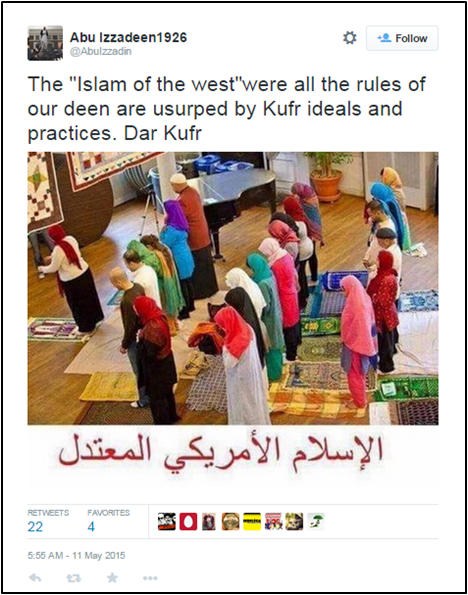
Using the #Texasattack hashtag, Izzadeen issued a series of condemnations of the United States following the May 2015 Islamist attack on a Draw Muhammad cartoon contest in Garland, Texas. He called the contest “clear proof” that the United States had launched a “crusade” against Islam,Abu Izzadeen, Twitter post, May 4, 2015, 5:45 a.m., https://twitter.com/AbuIzzadin/status/595162247216902144. and condemned insults to the prophet under the guise of free speech.Abu Izzadeen, Twitter post, May 4, 2015, 5:56 a.m., https://twitter.com/AbuIzzadin/status/595165099138101248.
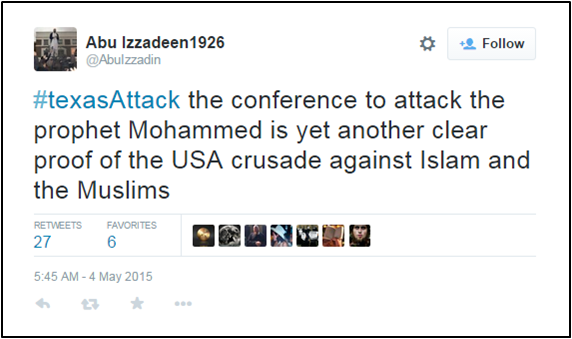
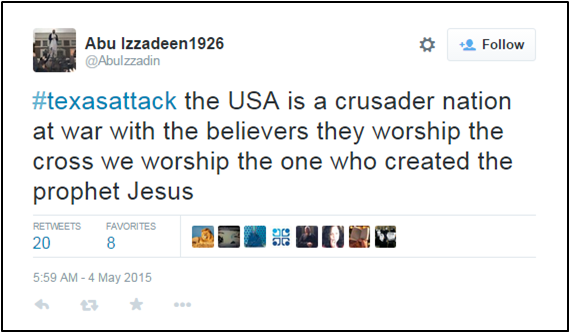
Izzadeen briefly operated a Facebook account in October 2015.Abu Izzadeen, Facebook, accessed October 15, 2015, https://www.facebook.com/abu.izzadeen.9;
Abu Izzadeen, Twitter post, October 15, 2015, 4:30 a.m., https://twitter.com/d08adeea5ef1431/status/654575069566529536. Several videos of Izzadeen’s speeches and interactions with British police are available on YouTube channels operating in his name. As of March 2017, one of the channels, created in March 2015, remains open but the videos have been removed.Abu Izzadeen, YouTube, accessed November 6, 2015, https://www.youtube.com/channel/UCyHTsKhVBZdP7Bp5F93oLoQ. Videos of Izzadeen remain up on another YouTube account, created in 2011. That channel, which spells Izzadeen’s name as “abuizzaddeen” is described as his official channel.Abu Izzadeen, YouTube, accessed March 22, 2017, https://www.youtube.com/user/abuizzaddeen/videos.
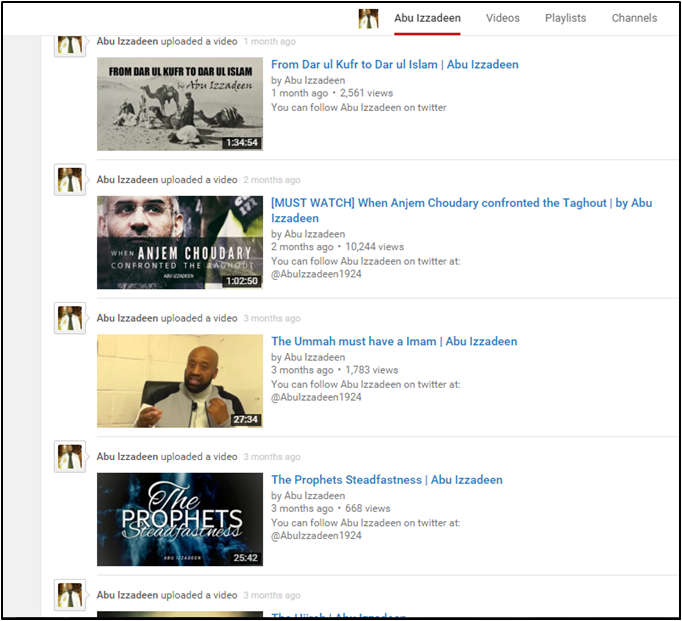
Screengrab of the YouTube channel Abu Izzadeen purportedly created in March 2015.

As of March 2017, a YouTube channel operating on behalf of Izzadeen remained active but the videos had been removed.

Videos of Izzadeen remain accessible on another YouTube account, created in 2011.
The British Home Office denied Izzadeen’s request for a passport in April 2015 on the grounds that he would likely go to Syria to fight alongside ISIS.“Preacher with links to Islamist firebrand Anjem Choudary hit with travel ban over terror risk,” Daily Mail (London), April 11, 2015, http://www.dailymail.co.uk/news/article-3035134/Preacher-links-Islamist-firebrand-Anjem-Choudary-hit-travel-ban-terror-risk.html. Izzadeen was arrested in Hungary on November 14, 2015, in violation of the travel ban.Steph Cockroft and Tom Wyke, “British extremists appear in court surrounded by machinegun-toting guards after they were caught in Hungary despite being banned from leaving the UK,” Daily Mail (London), November 19, 2015, http://www.dailymail.co.uk/news/article-3325459/British-extremists-appear-court-surrounded-machinegun-toting-guards-caught-Hungary-despite-banned-leaving-UK.html. When authorities asked for identification, Izzadeen presented a Quran. Authorities detained Izzadeen when he could not prove he was in Hungary legally. He also requested mineral water while in custody because tap water made him ill, he said. A Hungarian court decided to deport Izzadeen to Britain.“Hungary to deport Britons convicted of financing terror,” Associated Press, November 19, 2015, http://bigstory.ap.org/article/31dd544336e249f489b2b750ed7d0c53/hungary-deport-briton-convicted-financing-terror. On January 6, 2016, he was sentenced to two years in prison for violating the terms of his release.Tim Lamden and Euan McLelland, “Revealed: How at least FIVE more British Islamic extremists with links to Jihadi Sid have slipped out of the UK in the past 20 months despite being on bail or subject to travel bans,” Daily Mail (London), January 6, 2016, http://www.dailymail.co.uk/news/article-3388028/Jihadi-Sid-fled-Britain-prompting-crackdown-bail-terror-suspectses.html; Jamie McKinnell, “Islamic extremists jailed for "serious and deliberate" breach of counter-terrorism restrictions,” Mirror (London), January 8, 2016, http://www.mirror.co.uk/news/uk-news/islamic-extremists-jailed-serious-deliberate-7142974. Despite his imprisonment, Izzadeen continued to influence others. A November 2021 report revealed Izzadeen attended the gym and prayers with Khairi Saadallah, the Libyan asylum seeker who killed three people in a stabbing spree in Reading, England, in June 2020.Duncan Gardham, “Khairi Saadallah: Terrorist who murdered three in 'brutal' Reading attack gets whole life sentence,” Sky News, January 11, 2021, https://news.sky.com/story/khairi-saadallah-terrorist-who-murdered-three-in-brutal-reading-attack-gets-whole-life-sentence-12184977; Lizzie Dearden, “Prison unit for UK’s most dangerous terrorists could be radicalising inmates even more,” Independent (London), January 17, 2021, https://www.independent.co.uk/news/uk/home-news/terrorist-prisoners-separation-centres-radicalise-frankland-b1780957.html. Izzadeen was reportedly released in December 2017.Dipesh Gadher, “Release of hate preacher Anjem Choudary sparks fears of terrorist supergroup,” Times (London), September 23, 2018, https://www.thetimes.co.uk/article/release-of-hate-preacher-anjem-choudary-sparks-fears-of-terrorist-supergroup-vn9tzsnqs.
On December 15, 2020, Izzadeen’s former wife, Khadidja Benboukhemis, was sentenced to three years in prison after being convicted of disseminating terrorist material, including ISIS propaganda video “Flames of War 2.” The hour-long video features graphic beheadings and executions.Adela Whittingham, Lorraine King, and Carl Eve, “Mum, 42, jailed for sharing ISIS videos of beheadings and childhood mutilation,” Daily Mirror, December 15, 2020, https://www.mirror.co.uk/news/uk-news/mum-42-jailed-sharing-isis-23172767. According to the judge, Benboukhemi was well aware of and supported her then- husband’s allegiances.Adela Whittingham and Carl Eve, “Plymouth mum jailed for sharing terrorist video of beheadings,” Plymouth Live, December 15, 2020, https://www.plymouthherald.co.uk/news/plymouth-news/plymouth-mum-jailed-sharing-terrorist-4801601?_ga=2.76195549.910572949.1614636472-1315635893.1614091986.
Izzadeen has continued to meet with Islamist contacts, most notably Choudary. In 2016, British authorities convicted Choudary of inviting support for ISIS and sentenced him to more than five years in prison.Stephen Castle, “Anjem Choudary Is Sentenced to Prison for Promoting ISIS,” New York Times, September 6, 2016, http://www.nytimes.com/2016/09/07/world/europe/anjem-choudary-sentenced-isis.html. Choudary was released on probation in October 2018 and the authorities imposed several restrictions on his communications.“Anjem Choudary: Radical preacher released from prison,” BBC News, October 19, 2018, https://www.bbc.com/news/uk-45911160. Those restrictions expired in July 2021.Max Stephens and Gareth Davies, Anjem Choudary free to preach again as he gives first public statement since release from prison,” Telegraph (London), July 19, 2021, https://www.telegraph.co.uk/news/2021/07/19/anjem-choudary-free-preach-gives-first-public-statement-since/. Referring to Izzadeen as a “close friend,” Choudary told London’s Express newspaper in November 2021 he had met with Izzadeen and other former associates from al-Muhajiroun.Dominik Lemanski, “Fears of reinstating terrorism group as extremist leaves prison and meets old friends, Express (London), November 28, 2021, https://www.express.co.uk/news/uk/1528390/terror-muslim-group-abu-izzadeen-trevor-brooks. Izzadeen told Express he would continue to “come out in society and challenge the dominant thoughts and ideas.”Dominik Lemanski, “Fears of reinstating terrorism group as extremist leaves prison and meets old friends, Express (London), November 28, 2021, https://www.express.co.uk/news/uk/1528390/terror-muslim-group-abu-izzadeen-trevor-brooks. Referring to Choudary as his “close brother,” Izzadeen declared they both want “to offer an Islamic alternative.”Dominik Lemanski, “Fears of reinstating terrorism group as extremist leaves prison and meets old friends, Express (London), November 28, 2021, https://www.express.co.uk/news/uk/1528390/terror-muslim-group-abu-izzadeen-trevor-brooks.
Izzadeen’s previous accounts on Twitter have been suspended.Abu Izzadeen, Twitter account, accessed August 3, 2015, https://twitter.com/IzzadeenAbu. Nonetheless, Izzadeen returned to the platform on October 29, 2022.Abu Izzadeen, Twitter account, accessed November 7, 2022, https://twitter.com/Abuizzadeen2022. He has since used that account to call for the release by force of accused al-Qaeda supporter Aafia Siddiqui from U.S. prison,Abu Izzadeen, Twitter post, November 9, 2022, 5:37 a.m., https://twitter.com/Abuizzadeen2022/status/1590292553240260609. the implementation of sharia and the creation of a caliphate across the Muslim world,Abu Izzadeen, Twitter post, November 9, 2022, 3:19 a.m., https://twitter.com/Abuizzadeen2022/status/1590257713258582016. the suppression of “man made laws” in favor of sharia,Abu Izzadeen, Twitter post, November 6, 2022, 1:54 p.m., https://twitter.com/Abuizzadeen2022/status/1589330345131769856. and for non-believers to “die in their rage.”Abu Izzadeen, Twitter post, November 9, 2022, 2:24 p.m., https://twitter.com/Abuizzadeen2022/status/1590425008572354561. He has also promoted social media accounts affiliated with Ahmad Musa Jibril, at one time considered one of the top Islamist propagandists online.Abu Izzadeen, Twitter post, October 30, 2022, 3:51 p.m., https://twitter.com/Abuizzadeen2022/status/1586807908406378501. Twitter again suspended Izzadeen on November 15, 2022.Abu Izzadeen, Twitter account, accessed November 15, 2022, https://twitter.com/Abuizzadeen2022.
- @abuizzadeen1924
“The Ummah must have a Imam | Abu Izzadeen,” YouTube video, 27:33, posted by Abu Izzadeen, August 1, 2015, https://www.youtube.com/watch?v=XK0_7i7XwpA.
- @AbuIzzadinAAbu Izzadeen, Twitter, accessed September 21, 2015, https://twitter.com/d08adeea5ef1431.
- @d08adeea5ef1431Abu Izzadeen, Twitter, accessed September 21, 2015, https://twitter.com/d08adeea5ef1431.
- @IzzadeenAbuAbu Izzadeen, Twitter, accessed July 31, 2015, https://twitter.com/IzzadeenAbu.
- Abu IzzadeenAbu Izzadeen, Twitter, accessed July 31, 2015, https://twitter.com/IzzadeenAbu.
- Abu Izzadeen1926Abu Izzadeen1926, Twitter, accessed July 30, 2015, https://twitter.com/AbuIzzadin.
- Omar Brooks“Profile: Abu Izzadeen,” BBC News, August 17, 2008, http://news.bbc.co.uk/2/hi/uk_news/7353136.stm.
- Omar IzzadeenRoxanne Escobales, “Q&A: Abu Izzadeen,” Guardian (London), April 18, 2015, http://www.theguardian.com/uk/2008/apr/18/uksecurity2.
- Trevor BrooksRoxanne Escobales, “Q&A: Abu Izzadeen,” Guardian (London), April 18, 2015, http://www.theguardian.com/uk/2008/apr/18/uksecurity2.
Propagandist, United Kingdom: Islamist propagandist and radical cleric who has been imprisoned in the United Kingdom for inciting and fundraising for terrorism and for association with radical Islamist groups. Brooks was found guilty of inciting terrorism in 2008 but was released early in 2009. He was again arrested in November 2015 at a Hungarian border crossing aboard a train bound for Romania, in violation of parole, and was subsequently deported back to the United Kingdom.
Converted at age 17. Born Trevor Brooks, Izzadeen reportedly radicalized in the 1990s after meeting Omar Bakri Muhammad at London’s Finsbury Park Mosque. He became a bodyguard for Bakri Mohammad and a primary spokesman for Al Ghurabaa, an extremist group founded by some of Bakri Muhammad’s followers. (Age at conversion: 17)
A.k.a. Omar Brooks. Propagandist: Islamist cleric previously imprisoned in the United Kingdom for inciting and fundraising for terrorism. Released in December 2017.
Spoke alongside Faisal in online chatrooms following Faisal’s rise in popularity with the 2007 creation of the Revolution Muslim website.
Born Trevor Brooks. Islamist propagandist and radical cleric who has been imprisoned in the United Kingdom for inciting and fundraising for terrorism and for association with radical Islamist groups Al Ghurabaa and al-Muhajiroun. Arrested in 2008 alongside Shah Jalal Hussain, Simon Keeler, Abdul Saleem, Ibrahim Hassan, and Abdul Muhid in relation to extremist speeches at the Regent’s Park mosque on November 9, 2004. The group called for the assassination of George W. Bush and Tony Blair, for Muslims to become foreign fighters, and for Muslims to obey Osama bin Laden. Convicted of fundraising for terrorism and inciting violence against British and U.S. forces. Sentenced in April 2008 to three years and six months in prison. Arrested in November 2015 aboard a Romania-bound train with convicted terrorist Simon Keeler, in violation of travel restrictions. Sentenced to two years in prison in January 2016. Reportedly released in December 2017.
Reportedly served as an enforcer for al-Muhajiroun and bodyguard for Omar Bakri Muhammad. Choudary condemned Izzadeen’s 2007 arrest on terror charges as part of a “witch hunt” against Muslims. Izzadeen and Choudary subsequently led protests and spoke together at events. Led al-Muhajiroun successor group al-Ghurabaa in 2004. Launched Ahl ul-Sunnah Wa al-Jamma—another iteration of al-Muhajiroun—in November 2005 alongside Choudary, Keeler, and Abu Uzair. Met with Choudary in November 2021 months after the expiration of government restrictions on Choudary’s communications and later praised his and Choudary’s commitment to an Islamist agenda.
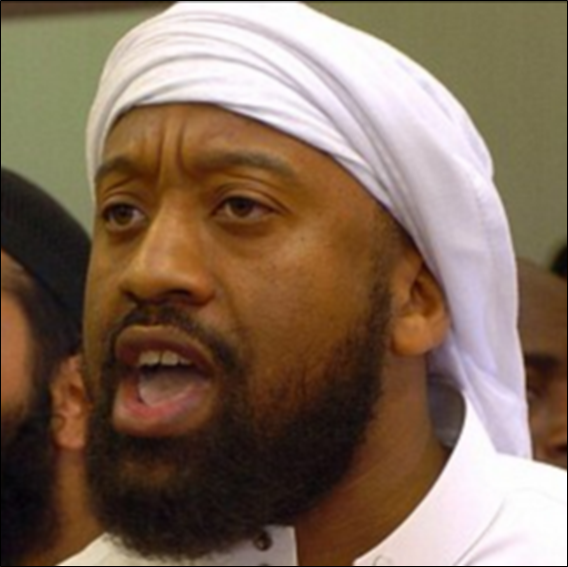
The Twitter user known as “Bint Crackers” maintains what she called a “shoutout” account, drawing attention to other jihadist Twitter users.Bint Crackers, Twitter post, July 9, 2015, 8:37 p.m., https://twitter.com/ummglasses/status/619304378063716352. Her stated goal is to help other users find their “baqiya family,” other ISIS supporters. Crackers does not explicitly call for violence, but she supports other “radical” users who make “the kuffar so angry that they could just go die in their rage.”Bint Crackers, Twitter post, July 9, 2015, 5:32 p.m., https://twitter.com/ummglasses/status/619257803597676546.
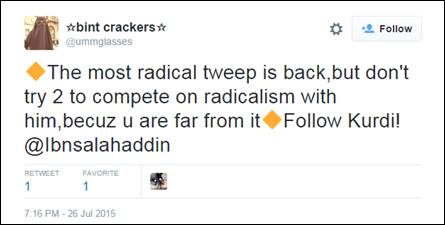
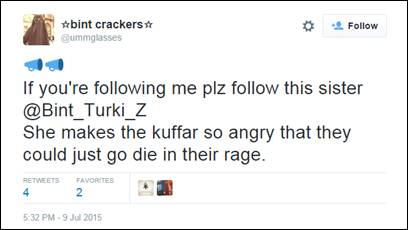
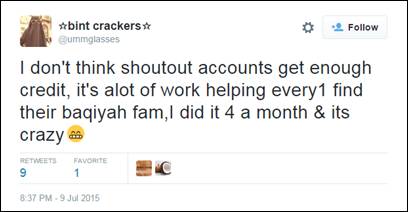
The accounts Crackers directs followers to are regularly suspended and reappear under new names.
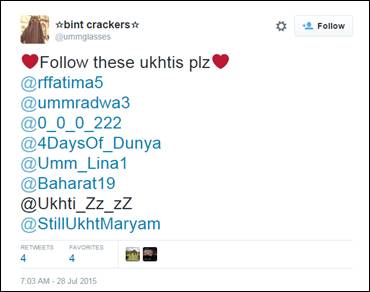
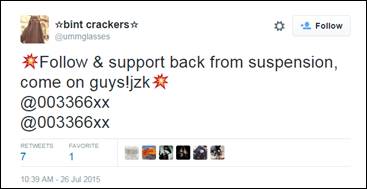
Crackers also warned her “uktis,” Islamic brothers and sisters, about fake accounts and posting too much information online.
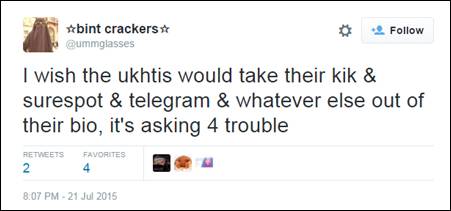
Crackers advocates an extreme adherence to Islam. She has threatened to ban users who not wear a hijab, and castigated al-Qaeda supporters for not wearing a hijab.
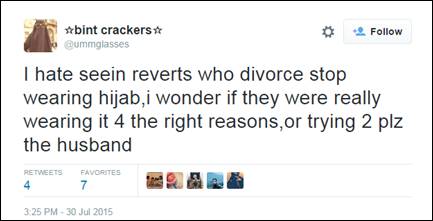
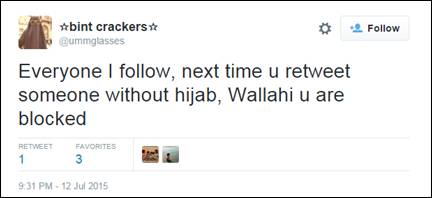
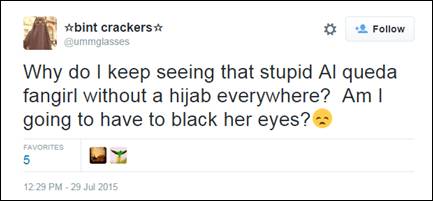
Crackers has also promoted radical Islamist preachers such as Abu Haleema, a British cleric who has been banned from social media for promoting terrorism.Martin Bentham and Colin Cortbus, “Radical London preacher Abu Haleema banned from promoting his views online,” London Evening Standard, May 26, 2015, http://www.standard.co.uk/news/crime/radical-london-preacher-abu-haleema-banned-from-promoting-his-views-online-10275924.html.
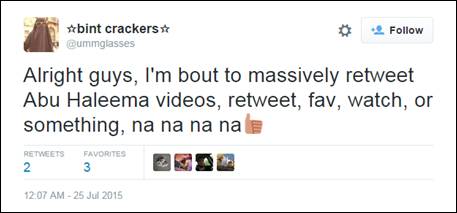
Crackers also maintained an Ask.fm account, which she deactivated on August 3, 2015. She revealed on Ask.fm that she is a convert to Islam, she is single, and she does not live in ISIS-held territory.Bint Crackers, Ask.fm post, July 29, 2015, http://ask.fm/abc1to3/answer/130603298117.

Crackers does not reveal her location, but some posts suggest she is a U.S. citizen or at least from the West. Despite her support for Islamist Twitter users, Crackers has posted tweets calling on U.S. President Barack Obama to take action against Syrian President Bashar al-Assad.
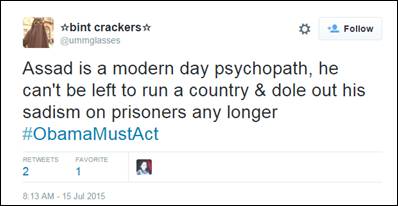
Crackers also questioned the Iranian nuclear deal because of Iran’s anti-America ideology.
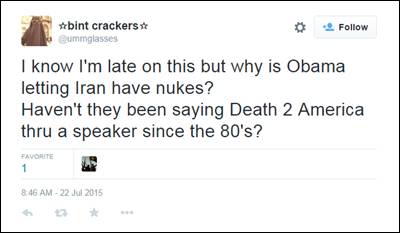
Crackers deactivated her Twitter account on August 3, 2015, shortly after privatizing her tweets. Crackers admitted she had been previously suspended, but it is unknown how many Twitter accounts she held.
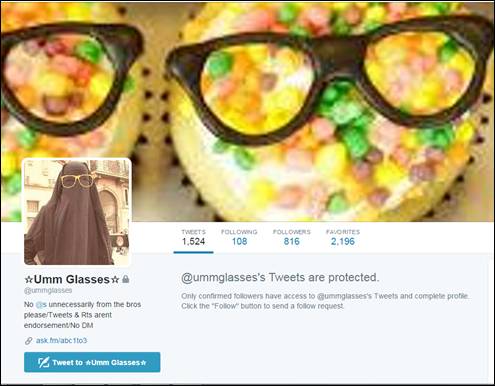


Crackers returned to Twitter a few days later. Her profile, once again public, revealed that she had announced she would take a break from Twitter for a few days.Bint Crackers, Twitter post, August 1, 2015, 7:34 a.m., https://twitter.com/ummglasses/status/627442321693356032.
|
|

“Abu Mutassim” is an extremist Twitter personality and proponent of the khilafah (caliphate), referring to the self-proclaimed Islamic State, or ISIS-controlled territory. Mutassim regularly retweets posts by Anjem Choudary, an extremist British preacher and ISIS sympathizer whom authorities have connected to hundreds of British Muslims arrested in terrorism-related cases.Martin Bentham and Colin Bortbus, “Radical London preacher Abu Haleema banned from promoting his views online,” London Evening Standard, May 26, 2015, http://www.standard.co.uk/news/crime/radical-london-preacher-abu-haleema-banned-from-promoting-his-views-online-10275924.html; Clarissa Ward, “Campaigning for ISIS In the West,” CBS, November 4, 2014, http://www.cbsnews.com/news/recruiting-for-isis-60-minutes/.
Mutassim regularly tweets blatant support for the self-proclaimed Islamic State:



CEP suspects that Mutassim operates out of the United Kingdom. In various tweets, he has called on Prime Minister David Cameron to commit suicide, and for the “khilafah” to “come” to Britain.
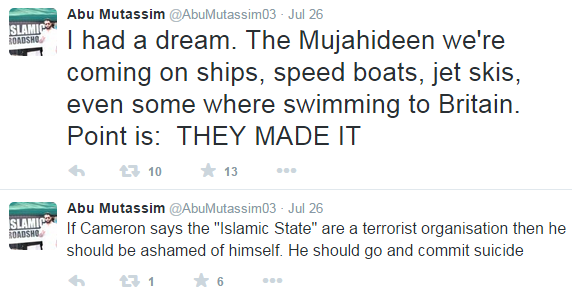

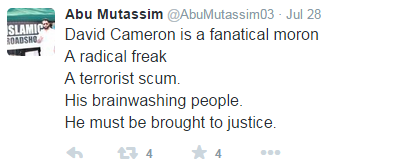
In a thinly veiled threat to the U.K. government, Mutassim posited what would happen if ISIS’s self-proclaimed caliph Abu Bakr al-Baghdadi were to “[kick] down the doors of 10 Downing street,” Prime Minister David Cameron’s address.

Abu Mutassim sees Islam as a final goal, and his rhetoric suggests that he believes all societies must eventually accept a totalitarian conception of Islam.
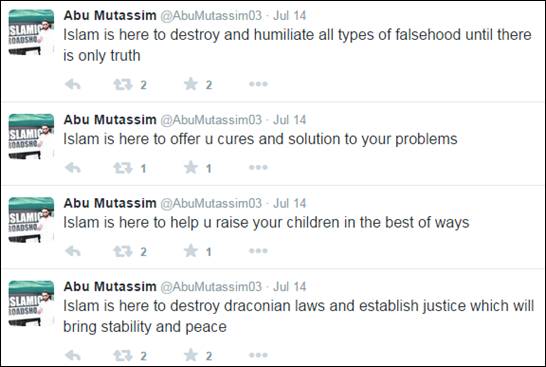
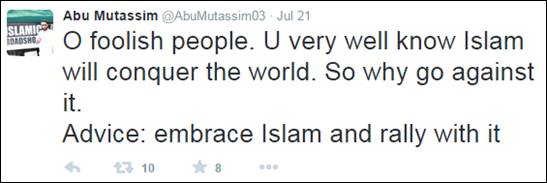
His extremist views follow an all-or-nothing rationale, in which Islam and the “caliphate” represent all that is good, and all else represents everything that is bad. Mutassim refers to anything non-Muslim as kufr (kuffar, or nonbelievers).
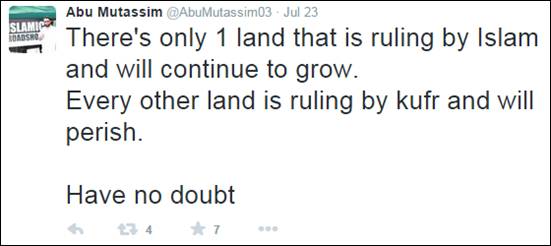

The version of Islam that he promotes is radical and extremist. Mutassim advocates the strictest form of sharia (Islamic law), in which thieves have their hands chopped off as punishment. He also promotes sectarian hatred, deriding “Shia” (Shiite) Muslims:
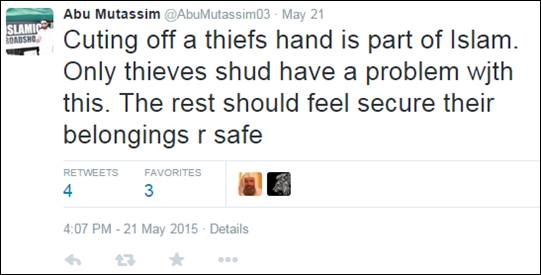

Mutassim disparages “moderate” Muslims, and refers to the concept of “interfaith” as a “disgusting title.”


He has referred to Jews as the “descendants of apes and pigs”:

Abu Mutassim has tweeted about the value of spreading “the truth” over social media, asserting that “Muslims must use [social media]” to spread it.

In addition to publishing incendiary tweets, Mutassim uses Twitter as a platform to disseminate his YouTube videos, which carry such titles as “Imaams of Hellfire” and “Battle of FAITH.”Abu Mutassim, YouTube, accessed August 3, 2015, https://www.youtube.com/channel/UCDUpgOGr0lAVERxswSAYJFQ/videos. Mutassim has filmed propagandizing videos alongside Abu Haleema, a fellow U.K.-based extremist.
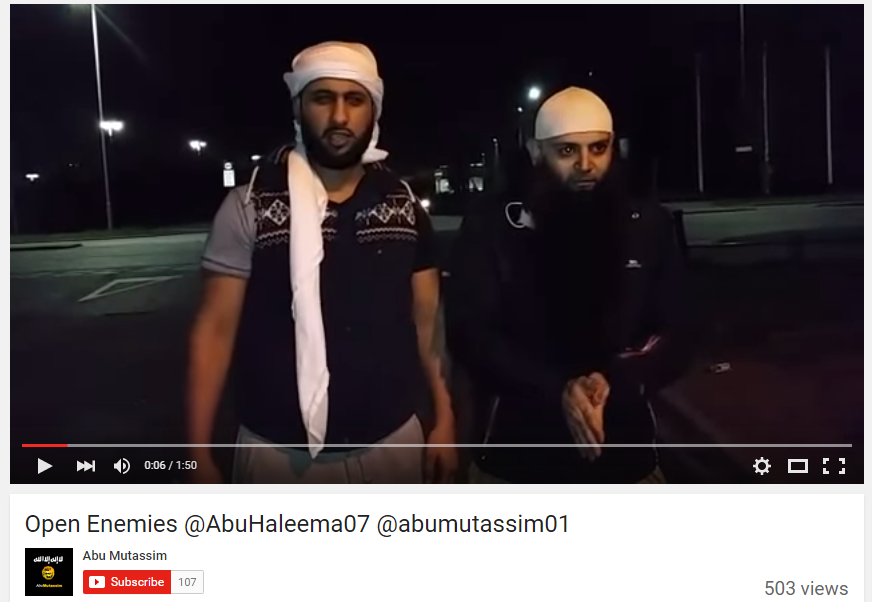
His videos appear to be filmed in Britain, and some have garnered upward of 3,000 views.
- @AbuMusassim03Abu Mutassim, Twitter, accessed August 3, 2015, https://twitter.com/AbuMutassim03.
- @AbuMutassim01“Open Enemies @AbuHaleema07 @abumutassim01,” YouTube video, 1:50, posted by “Abu Mutassim,” March 23, 2015, https://www.youtube.com/watch?v=QgwsEPnYKMQ.
- @AbuMutassim“Battle of FAITH- Abu Mutassim,” YouTube video, 4:19, posted by “Abu Mutassim,” July 11, 2015, https://www.youtube.com/watch?v=-pAkb_nHx9w.
- @MutassimAbuAbu Mutassim, Twitter, accessed September 26, 2015, https://twitter.com/MutassimAbu.
- AbuMutassim4Abu Mutassim, Instagram, accessed September 30, 2015, https://instagram.com/abumutassim4/.

“Abu Luqmaan Almani” is a Twitter personality and propagandist for ISIS, most likely operating out of ISIS-controlled territory. Almani tweets almost entirely in German,Abu Luqmaan Almani, Twitter post, June 30, 2015, 8:10 a.m., https://twitter.com/Abu_luqmaan_al/status/615900342996348929. but will retweet content in English and Arabic.Abu Luqmaan Almani, Twitter, accessed July 15, 2015, https://twitter.com/abu_luqmaan_al.
A Twitter account with the username “Erasmus Monitor” whose bio reads: “Monitoring German jihadis, their networks and finances; researching in Security Sector Reform”Erasmus Monitor, Twitter, accessed July 16, 2015, https://twitter.com/Erasmus_Monitor. has engaged in Twitter conversations with Almani. On June 29, 2015, Erasmus Monitor tweeted that Luqmaan al-Almani, allegedly from Düsseldorf, was reported dead. Almani replied “Alhamdulillah [thanks be to God] I’m fine, I can still make a bit of terror.”Abu Luqmaan Almani, Twitter post, June 30, 2015, 10:11 p.m., https://twitter.com/Abu_luqmaan_al/status/617923780304891904.
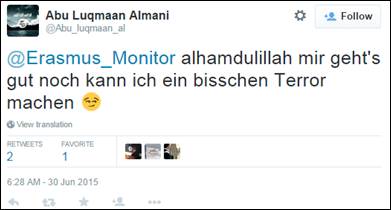
Translation: “Alhamdulillah [thanks be to God] I’m fine, I can still make a bit of terror”
Almani posts images of jihadists displaying the ISIS flagAbu Luqmaan Almani, Twitter post, July 1, 2015, 7:51 p.m., https://twitter.com/Abu_luqmaan_al/status/616439135167991808. and weaponry.Abu Luqmaan Almani, Twitter post, July 1, 2015, 2:45 p.m., https://twitter.com/Abu_luqmaan_al/status/616362016178110464. He tweets images that normalize violence, such as in June 2015 when he posted the following cartoon:Abu Luqmaan Almani, Twitter post, June 30, 2015, 5:39 p.m., https://twitter.com/Abu_luqmaan_al/status/616043397644746752.
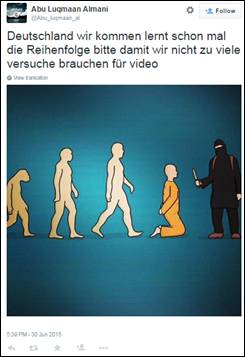
Translation: “Germany we’re coming. Learn the order before, please, so that we won’t need too many attempts for the video”
Almani boasts his allegiance to ISIS, and frequently tweets photos of the terror group’s flag with laudatory comments, such as “Alhamdulillah [thanks be to God] the Islamic state.”Abu Luqmaan Almani, Twitter post, June 1, 2015, 4:11 p.m., https://twitter.com/Abu_luqmaan_al/status/616383696606756864.

Translation: “Alhamdulillah [thanks be to God] the Islamic state.”
His first tweet included a photo of an explosion, with the text: “it is not much longer until Europe will no more know such pictures on the internet, rather see them live”:Abu Luqmaan Almani, Twitter post, June 30, 2015, 8:10 a.m., https://twitter.com/Abu_luqmaan_al/status/615900342996348929.
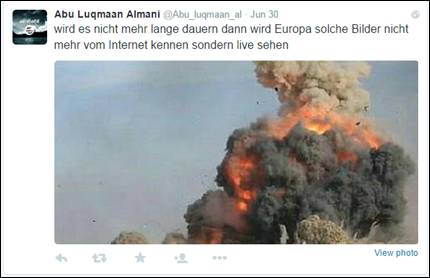
Translation: “It is not much longer until Europe will no more know such pictures on the internet, rather see them live”
Almani has tweeted photos of the ISIS flag with messages directed at Germany, writing, “Germany, these flags will fly above you, bi idnillah (God willing). Your women taken as slaves and your men killed.”Abu Luqmaan Almani, Twitter post, July 1, 2015, 7:51 p.m., https://twitter.com/Abu_luqmaan_al/status/616439135167991808.
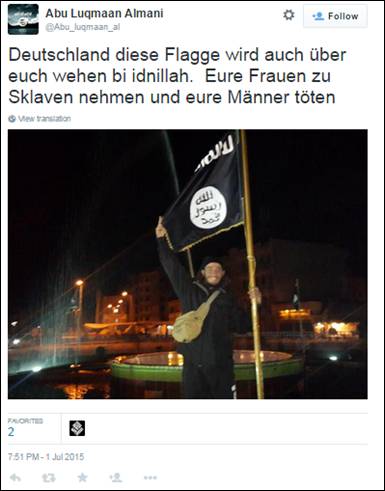
Translation: “Germany, these flags will fly above you, bi idnillah (God willing). Your women taken as slaves and your men killed.”Abu Luqmaan Almani, Twitter post, July 1, 2015, 7:51 p.m., https://twitter.com/Abu_luqmaan_al/status/616439135167991808.
In July 2015, Almani tweeted a photo of a belt laced with explosives. In the caption, he wrote “the belt is ready for the kuffar (nonbelievers). May ALLAH annihilate the kuffar through our hands.”Abu Luqmaan Almani, Twitter post, June 1, 2015, 4:11 p.m., https://twitter.com/Abu_luqmaan_al/status/616383696606756864.
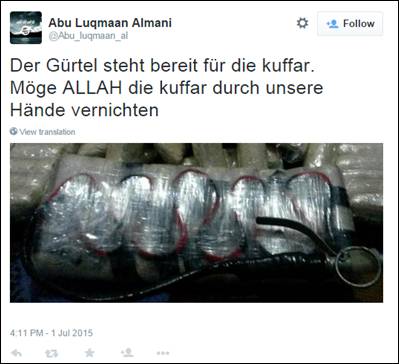
Translation: “The belt is ready for the kuffar (nonbelievers). May ALLAH annihilate the kuffar through our hands”Abu Luqmaan Almani, Twitter post, June 1, 2015, 4:11 p.m., https://twitter.com/Abu_luqmaan_al/status/616383696606756864.
In what may be an attempt to normalize allegiance with ISIS, Almani posts pictures of kittens in front of the ISIS flag accompanied by amusing tweets such as, “I’ve radicalized my cat.”Abu Luqmaan Almani, Twitter post, June 30, 2015, 8:51 a.m., https://twitter.com/Abu_luqmaan_al/status/615910550644596736.
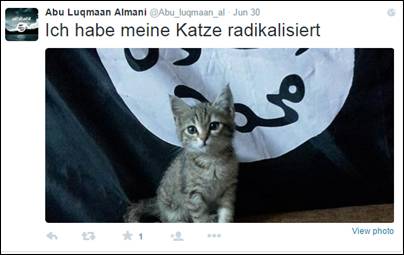
Translation: “I’ve radicalized my cat”
- @Abu_luqmaan_alAbu Luqmaan Almani, Twitter, accessed July 15, 2015, https://twitter.com/abu_luqmaan_al.

“Hass Coast” is a propagandist for ISIS who purportedly lives in ISIS-held territory. On Twitter, Coast propagates pro-ISIS material, including violent imagery and extremist sentiments. The account is peppered with youthful language and symbols, with the apparent effect of normalizing allegiance to ISIS and life under ISIS rule.
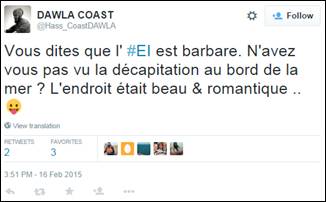
Translation: “You say that #IS [Islamic State] is barbaric. Have you not seen the seaside decapitation? The place was beautiful & romantique…”
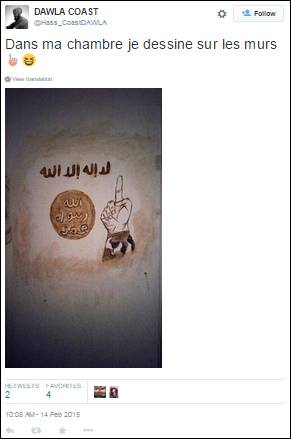
Pro-ISIS symbols accompanied by caption. Translation: “In my room I draw on the walls”
Hass Coast encourages viewers to make hijra (migrate) to ISIS-held territory. In April 2015, Coast posted a tweet encouraging migration and accompanied by a picture of an ISIS member holding a flag. She wrote, “For all of time, Islam has triumphed thanks to ALLAH… in two ways: hijra (migration) & jihad…”DAWLA COAST, Twitter post, April 1, 2015, 1:37 p.m., https://twitter.com/Hass_CoastDAWLA/status/583367697372733440.
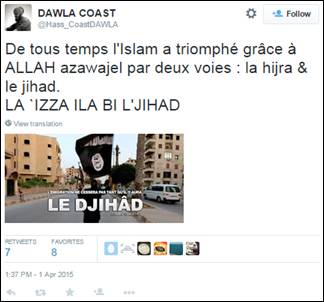
Translation: “For all of time, Islam has triumphed thanks to ALLAH… in two ways: hijra (migration) & jihad…”
On her Twitter feed, Coast has also issued vague threats against France, writing, “Warn France [that] our children know her but she does not know them. Hate for her is in the blood! #Massacre #Generation[Islamic]State.”DAWLA COAST, Twitter post, June 25, 2015, 3:25 a.m., https://twitter.com/Hass_CoastDAWLA/status/614016665068699648.
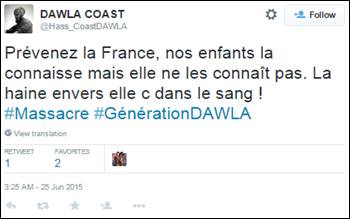
Translation: “Warn France [that] our children know her but she does not know them. Hate for her is in the blood! #Massacre #Generation[Islamic]State”
Coast also frequently talks about her husband.DAWLA COAST, Twitter post, April 1, 2015, 12:58 p.m., https://twitter.com/Hass_CoastDAWLA/status/583357822592745472. She has maintained a Facebook account.DAWLA COAST, Twitter post, December 20, 2014, 1:04 p.m., https://twitter.com/Hass_CoastDAWLA/status/546410797065584643.
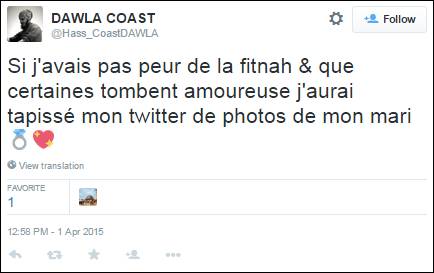
Translation: “If I wasn’t afraid of [causing global] disunity & some people falling in love[,] I would paper my Twitter with photos of my husband.”
- @Hass_CoastDAWLADAWLA COAST, Twitter, accessed July 22, 2015, https://twitter.com/Hass_CoastDAWLA.
- DAWLA COASTDAWLA COAST, Twitter, accessed July 22, 2015, https://twitter.com/Hass_CoastDAWLA.
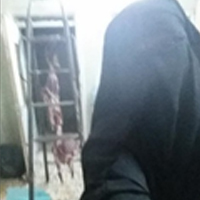
“Abu Haleema” is a U.K.-based Islamist extremist who has long been active on social media platforms including YouTube, Twitter, and Facebook, despite being banned from using those platforms by the U.K. government. In many of his online lectures, Abu Haleema speaks at the camera in a hurried voice, often shaking his finger and warning Muslims against “allying with the kuffar [nonbelievers]”“Allying with the Kuffar,” YouTube video, 2:11, posted by “Abu Haleema,” July 15, 2015, https://www.youtube.com/watch?v=kJs-TKcjvqM. or getting “cozy” with the taghut (rejecters of Islam).“You Haven’t entered islam @AbuHaleema16,” YouTube video, 2:06, posted by “Abu Haleema,” April 8, 2015, https://www.youtube.com/watch?v=REhw7HcA1z4. Haleema is a suspected supporter of ISIS, and regularly refers to the khilafah (caliphate). In a March 2015 YouTube video titled “Sharia over your noses,” Haleema warned, “Soon we’re going to see the black flag of sharia [Islamic law] in the white house. We’re going to see the black flag of sharia over Windsor castle. We’re going to see the black flag of the khilafah on the Suez Canal.”“Sharia over your noses @AbuHaleema16,” YouTube video, 2:35, posted by “Abu Haleema,” March 31, 2015, https://www.youtube.com/watch?v=PpgtIiiq3ws. Haleema was imprisoned in 2021 for disseminating a video praising Nigerian extremist group Boko Haram on the anniversary of the September 11 attacks.“Shakil Chapra jailed over 9/11 anniversary WhatsApp video,” BBC News, July 2, 2021, https://www.bbc.com/news/uk-england-berkshire-57698939.
Haleema is an associate of imprisoned ISIS supporter Anjem Choudary, the founder of banned Islamist group al-Muhajiroun. Choudary has been linked to hundreds of extremist and terrorist cases in the United Kingdom.Martin Bentham and Colin Bortbus, “Radical London preacher Abu Haleema banned from promoting his views online,” London Evening Standard, May 26, 2015, http://www.standard.co.uk/news/crime/radical-london-preacher-abu-haleema-banned-from-promoting-his-views-online-10275924.html;
Clarissa Ward, “Campaigning for ISIS In the West,” CBS, November 4, 2014, http://www.cbsnews.com/news/recruiting-for-isis-60-minutes/. Haleema has also been tied to terrorists. Khuram Butt—one of the attackers in the June 3, 2017, London Bridge attacks—was reportedly radicalized in large part by lectures from both Choudary and Haleema, and had appeared in a documentary about Haleema released in 2016. Following the June 2017 attacks, YouTube removed Haleema’s lectures from its platform in the United Kingdom, but did not ban the videos worldwide.Josh Layton, “Hate preacher who targeted Small Heath hit by YouTube ban as TV link to London terrorist revealed,” Birmingham Mail, June 7, 2017, http://www.birminghammail.co.uk/news/midlands-news/hate-preacher-who-targeted-small-13153089. On June 8, 2017, a search for “Abu Haleema” on YouTube yielded nearly 10,000 search results when conducted in the United States.Counter Extremism Project. While a November 20, 2017, search yielded just under 2,000 search results, a YouTube channel dedicated to Haleema and featuring more than 100 of his videos had received more than half-a-million views.Counter Extremism Project.
Before his partial ban from YouTube, Haleema had resurfaced both there and on Twitter dozens of times.Abu Haleema, Twitter profile, accessed July 17, 2015, https://twitter.com/abuhaleema16. When appearing on Twitter, Haleema would regularly share the links to his videos on YouTube:
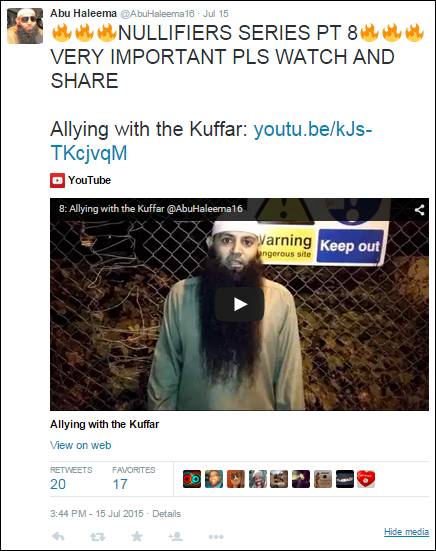
Haleema was arrested several times by British authorities. In April 2014, authorities raided Haleema’s home and confiscated his passport, accusing him of conspiring to travel to Syria to join an extremist group. Haleema denied the accusations and called the raid a “war against Islam.”“British man accused of wanting to travel to Syria has passport seized in raid,” ITV, April 24, 2014, http://www.itv.com/news/2014-04-24/british-man-accused-of-wanting-to-travel-to-syria-has-passport-seized/. In May 2015, Haleema was again arrested and detained in west London. He was released without charges on the condition that he would halt his use of social media.Martin Bentham and Colin Bortbus, “Radical London preacher Abu Haleema banned from promoting his views online,” London Evening Standard, May 26, 2015, http://www.standard.co.uk/news/crime/radical-london-preacher-abu-haleema-banned-from-promoting-his-views-online-10275924.html. Following his release, however, Haleema was again active on both YouTube and Twitter, producing almost daily YouTube videos and sharing their links on his Twitter page.Counter Extremism Project. Haleema has also been active on Facebook and Telegram.“ Extremist British Preacher Abu Haleema Launches Telegram Channel, Which Is Then Promoted By ISIS Activists,” MEMRI Cyber & Jihad Lab, March 1, 2016, http://cjlab.memri.org/lab-projects/tracking-jihadi-terrorist-use-of-social-media/extremist-british-preacher-abu-haleema-launches-telegram-channel-which-is-then-promoted-by-isis-activists/.
In January 2016, Channel 4 released a documentary called “The Jihadis Next Door.”Graham Ruddick, “Channel 4: police did not request footage from The Jihadis Next Door,” Guardian (London), June 6, 2017, https://www.theguardian.com/uk-news/2017/jun/06/channel-4-police-did-not-request-footage-jihadis-next-door.The film, which took two years to film, followed Haleema and his small band of extremists.Rachel Olding, “British extremist Abu Haleema turns to Australia,” Sydney Morning Herald, January 21, 2016, http://www.smh.com.au/nsw/british-extremist-abu-haleema-turns-to-australia-20160120-gma1zc.html. In one scene, Haleema laughed while watching an ISIS propaganda video of people being killed, saying, “that’s HD quality, bruv [brother].”Dominic Kennedy, “Muslim hate preacher flees UK home,” Australian (Sydney), June 7, 2017, http://www.theaustralian.com.au/news/world/the-times/london-terror-attack-muslim-hate-preacher-flees-uk-home/news-story/fdb4dd4a223a4c9cf03d384e53e81676. In the film, Haleema also confessed to having regular contact with a 14-year-old boy from Blackburn, Lancashire, convicted in a beheading plot targeting police officers during the Anzac Day parade in Australia.Dominic Kennedy, “Muslim hate preacher flees UK home,” Australian (Sydney), June 7, 2017, http://www.theaustralian.com.au/news/world/the-times/london-terror-attack-muslim-hate-preacher-flees-uk-home/news-story/fdb4dd4a223a4c9cf03d384e53e81676. According to Haleema, he had advised the boy against carrying out the plot and was released from custody due to insufficient evidence.Dominic Kennedy, “Muslim hate preacher flees UK home,” Australian (Sydney), June 7, 2017, http://www.theaustralian.com.au/news/world/the-times/london-terror-attack-muslim-hate-preacher-flees-uk-home/news-story/fdb4dd4a223a4c9cf03d384e53e81676. Also appearing in the film was June 2017 London Bridge attacker Khuram Shazad Butt.Dominic Kennedy, “Muslim hate preacher flees UK home,” Australian (Sydney), June 7, 2017, http://www.theaustralian.com.au/news/world/the-times/london-terror-attack-muslim-hate-preacher-flees-uk-home/news-story/fdb4dd4a223a4c9cf03d384e53e81676.
Haleema tailored his recruiting efforts to Australian and British audiences alike. In January 2016, he produced videos attacking moderate Australian clerics Shady Alsuleiman and Wesam Charkawi, both of whom reside in Sydney. In the same video, Haleema criticized Imam Sheikh Abu Adnan of Liverpool for allowing a policeman to give a talk to the mosque about domestic violence.Rachel Olding, “British extremist Abu Haleema turns to Australia,” Sydney Morning Herald, January 21, 2016, http://www.smh.com.au/nsw/british-extremist-abu-haleema-turns-to-australia-20160120-gma1zc.html.
Shortly before the June 2017 London Bridge attack, Haleema reportedly fled his home when his address was revealed to the public by Tommy Robinson, a far-right activist and founder of the English Defence League. According to a notice posted by Haleema’s landlord, he left without notice. Neighbors had previously avoided making Haleema’s address public under threat of arrest and prosecution by the police.Dominic Kennedy, “Muslim hate preacher flees UK home,” Australian (Sydney), June 7, 2017, http://www.theaustralian.com.au/news/world/the-times/london-terror-attack-muslim-hate-preacher-flees-uk-home/news-story/fdb4dd4a223a4c9cf03d384e53e81676.
As CEP has noted, YouTube has long failed to remove videos posted by Haleema that were flagged for more than a year. Google, YouTube’s parent company, said in March 2017 that Haleema’s videos do not meet the company standard for removal on the grounds of promoting terrorism.Josh Layton, “YouTube refuses to ban hate preacher Abu Haleema who targeted Small Heath,” Birmingham Mail, March 17, 2017, http://www.birminghammail.co.uk/news/midlands-news/youtube-refuses-ban-small-heath-12755883. Following the London Bridge attack, Google changed course, blocking Haleema’s videos as they appeared in the United Kingdom, although Haleema videos continued to be readily accessible in other countries.John Shammas, “Banned from YouTube: Hate cleric Abu Haleema who featured in ‘The Jihadis Next Door’ has his YouTube account blocked in the UK after London Bridge terror attack,” Sun (London), June 7, 2017, https://www.thesun.co.uk/news/3747961/hate-cleric-abu-haleema-who-featured-in-the-jihadis-next-door-has-his-youtube-account-blocked-in-the-uk-after-london-bridge-terror-attack/. According to Google Vice President Peter Baron, the company wants “to make sure that terrorists do not have a voice.”John Shammas, “Banned from YouTube: Hate cleric Abu Haleema who featured in ‘The Jihadis Next Door’ has his YouTube account blocked in the UK after London Bridge terror attack,” Sun (London), June 7, 2017, https://www.thesun.co.uk/news/3747961/hate-cleric-abu-haleema-who-featured-in-the-jihadis-next-door-has-his-youtube-account-blocked-in-the-uk-after-london-bridge-terror-attack/. A July 2017 YouTube search yielded 13,600 results.“Violent Extremist Content Still Found on YouTube,” Counter Extremism Project, July 26, 2017, https://www.counterextremism.com/blog/violent-extremist-content-still-found-youtube-0. A June 2019 search of YouTube yielded fewer than 200 results, but a YouTube channel called Abu Haleema Media continued to upload the propagandist’s videos.Abu Haleema Media, YouTube channel, accessed June 11, 2019, https://www.youtube.com/channel/UCPw-ZBqLUaWMIcKxy1Cz2SA.
Channel 4 and Netflix have since removed “The Jihadis Next Door” from their online streaming services worldwide.Graham Ruddick, “Channel 4: police did not request footage from The Jihadis Next Door,” Guardian (London), June 6, 2017, https://www.theguardian.com/uk-news/2017/jun/06/channel-4-police-did-not-request-footage-jihadis-next-door.
Despite multiple arrests and the seizure of his passport, Haleema’s identity was not publicly revealed until June 8, 2019. London’s Daily Mail revealed Haleema’s true identity as Shakil Chapra, a former used car salesman and bus driver. Haleema previously ran a used car dealership in Kilburn, England, for several years until the business closed in 2010. Afterward, Haleema reportedly worked as a bus driver in London. According to neighbors, Haleema had been involved with gangs and drugs at various points in his life.Abul Taher, “Unmasked: Islamic extremist linked to ringleader of London Bridge terror attacks and hate preacher Anjem Choudary is a former car dealer and part-time London bus driver,” Daily Mail (London), June 8, 2019, https://www.dailymail.co.uk/news/article-7119783/Islamic-extremist-linked-ringleader-London-Bridge-terror-attacks-London-bus-driver.html. Media identified him as Abu Haleema when British police raided his home and seized his passport in April 2014, but reports of Shakil Chapra’s September 2014 arrest alongside Choudary made no linkage to Haleema.“British man accused of wanting to travel to Syria has passport seized in raid,” ITV, April 24, 2014, http://www.itv.com/news/2014-04-24/british-man-accused-of-wanting-to-travel-to-syria-has-passport-seized/; Josh Halliday, “Islamist cleric allowed to preach in London while on bail,” Guardian (London), November 21, 2014, https://www.theguardian.com/politics/2014/nov/21/islamist-cleric-allowed-to-preach-london-bail-anjem-choudary. Until June 2019, there was no confirmation that the two were the same person.
Haleema was reportedly part of a WhatsApp group in March 2020, that received a video encouraging ISIS supporters to attack London’s Royal Concert Hall. The video was shared by Shehroz Iqbal, who was later found guilty of encouraging terrorism and disseminating ISIS propaganda.Sophie Tanno, “Extremist is Found Guilty of Terrorism for Telling ISIS Fanatics to 'Attack' the Royal Festival Hall in 'Chilling' Video he Shared with Fellow Islamists Including Star of 'The Jihadis Next Door',” Daily Mail, October 20, 2020, https://www.dailymail.co.uk/news/article-8860391/Extremist-guilty-terrorism-telling-ISIS-fanatics-attack-Royal-Festival-Hall.html.
Haleema’s participation in extremist Whatsapp groups led to his incarceration in 2021. On September 11, 2019, Haleema shared a clip of the leader of Nigerian terrorist group Boko Haram to a Whatsapp group and referred to the extremist as “the most gangster Nigerian.”“Shakil Chapra jailed over 9/11 anniversary WhatsApp video,” BBC News, July 2, 2021, https://www.bbc.com/news/uk-england-berkshire-57698939. Police became aware of the video after seizing a phone during an unrelated drugs investigation. According to court records, members of the group wished each other “happy 9/11” and called the day “a sweet 18 party.”“Shakil Chapra jailed over 9/11 anniversary WhatsApp video,” BBC News, July 2, 2021, https://www.bbc.com/news/uk-england-berkshire-57698939. On March 15, 2021, Haleema pleaded guilty to dissemination of terrorist publications.“Slough man admits sharing Boko Haram terror video,” BBC News, March 15, 2021, https://www.bbc.com/news/uk-england-berkshire-56378472. According to Judge Peter Lodder QC, the video was a direct reference to the September 11, 2001, attacks. On July 2, 2021, Haleema was sentenced to two years and six months in prison for dissemination of a terrorist publication. In addition, he was ordered to serve 12 months on extended license. According to Haleema’s defense attorney, he no longer supported ISIS and his “ideological view has changed.”“Shakil Chapra jailed over 9/11 anniversary WhatsApp video,” BBC News, July 2, 2021, https://www.bbc.com/news/uk-england-berkshire-57698939.
- @AbuHaleema68Abu Haleema, Twitter, accessed October 11, 2015, https://twitter.com/AbuHaleema68.
- @AbuHaleema70Abu Haleema, Twitter, accessed October 13, 2015, https://twitter.com/AbuHaleema70.
- @AbuHaleema71Abu Haleema, Twitter, accessed October 15, 2015, https://twitter.com/AbuHaleema71.
- @AbuHaleema72Abu Haleema, Twitter, accessed October 17, 2015, https://twitter.com/AbuHaleema72.
- @AbuHaleema73Abu Haleema, Twitter, accessed October 18, 2015, https://twitter.com/AbuHaleema73.
- @AbuHaleema75Abu Haleema, Twitter, accessed October 27, 2015, https://twitter.com/AbuHaleema75.
- @AbuHaleema81Abu Haleema, Twitter, accessed November 4, 2015, https://twitter.com/AbuHaleema81.
- @AbuHaleema83Abu Haleema, Twitter, accessed November 4, 2015, https://twitter.com/AbuHaleema83.
- @AbuHaleema84Abu Haleema, Twitter, accessed November 5, 2015, https://twitter.com/AbuHaleema84.
- @AbuHaleema85Abu Haleema, Twitter, accessed November 6, 2015, https://twitter.com/AbuHaleema85.
- @AbuHaleema86Abu Haleema, Twitter, accessed November 7, 2015, https://twitter.com/AbuHaleema86.
- @AbuHaleema87Abu Haleema, Twitter, accessed November 8, 2015, https://twitter.com/AbuHaleema87.
- @AbuHaleema88Abu Haleema, Twitter, accessed November 9, 2015, https://twitter.com/AbuHaleema88.
- @AbuHaleema89Abu Haleema, Twitter, accessed November 10, 2015, https://twitter.com/AbuHaleema89.
- @AbuHaleema90Abu Haleema, Twitter, accessed November 11, 2015, https://twitter.com/AbuHaleema90.
- @AbuHaleema91Abu Haleema, Twitter, accessed November 15, 2015, https://twitter.com/AbuHaleema91.
- @AbuHaleema92Abu Haleema, Twitter, accessed November 17, 2015, https://twitter.com/AbuHaleema92.
- @AbuHaleema93Abu Haleema, Twitter, accessed November 18, 2015, https://twitter.com/AbuHaleema93.
- @AbuHaleema94Abu Haleema, Twitter, accessed November 19, 2015, https://twitter.com/AbuHaleema94.
- @AbuHaleema96Abu Haleema, Twitter, accessed November 20, 2015, https://twitter.com/AbuHaleema96.
- @AbuHaleema97Abu Haleema, Twitter, accessed November 22, 2015, https://twitter.com/AbuHaleema97.
- @AbuHaleema98Abu Haleema, Twitter, accessed November 23, 2015, https://twitter.com/AbuHaleema98.
- @AbuHaleema99Abu Haleema, Twitter, accessed November 30, 2015, https://twitter.com/AbuHaleema99.
- @AbuHaleema108Abu Haleema, Twitter, accessed December 8, 2015, https://twitter.com/AbuHaleema108.
- @AbuHaleema110Abu Haleema, Twitter, accessed December 5, 2015, https://twitter.com/AbuHaleema110.
- @AbuHaleema111Abu Haleema, Twitter, accessed December 8, 2015, https://twitter.com/AbuHaleema111.
- @AbuHaleema112Abu Haleema, Twitter, accessed December 6, 2015, https://twitter.com/AbuHaleema112.
- @AbuHaleema120Abu Haleema, Twitter, accessed December 11, 2015, https://twitter.com/abuhaleema120.
- @2Abu9H8Abu Haleema Media, YouTube, accessed June 8, 2017, https://www.youtube.com/channel/UCPw-ZBqLUaWMIcKxy1Cz2SA.
A.k.a. Shakil Chapra. U.K.-based Islamist extremist who has long been active on social media platforms including YouTube, Twitter, and Facebook, despite being banned from using those platforms by the U.K. government. Arrested multiple times by British authorities. Featured in the 2016 Channel 4 film “The Jihadis Next Door.” Reportedly popular among Australian jihadists. Linked to June 2017 London Bridge attacker Khuram Shazad Butt. Admitted communication with an Australian teenager plotting an Anzac Day attack in Australia. YouTube restricted Haleema’s access after the London Bridge attack but his videos remain accessible online. Sentenced in July 2021 to two years and six months in prison for sharing a video glorifying terrorism on the anniversary of the 9/11 attacks in 2019.
Member of Choudary’s network of supporters and close associate of Choudary’s. Arrested alongside Choudary in September 2014 but released without charge. Refers to Choudary as his spiritual adviser.

Twitter personality “Abu Suleymaan” is a propagandist for ISIS.Abu Suleymaan, Twitter post, July 27, 2015, 8:32 a.m., https://twitter.com/TwistedStrangz/status/625690209276047360. His accounts have been repeatedly suspended by Twitter.

Suleymaan is an associate of Anjem Choudary, an extremist British preacher and ISIS sympathizer whom authorities have connected to hundreds of British Muslims arrested in terrorism-related cases.Martin Bentham and Colin Bortbus, “Radical London preacher Abu Haleema banned from promoting his views online,” London Evening Standard, May 26, 2015, http://www.standard.co.uk/news/crime/radical-london-preacher-abu-haleema-banned-from-promoting-his-views-online-10275924.html; Clarissa Ward, “Campaigning for ISIS In the West,” CBS, November 4, 2014, http://www.cbsnews.com/news/recruiting-for-isis-60-minutes/. On July 27, 2015, Suleymaan tweeted, “Anjem Choudary is the best da’ee [spreader of dawa, or proselytization] of the west.”

Suleymaan has also tweeted about his support for notorious Islamists such as Osama bin Laden, Omar Bakr Muhammad, and Abu Musab al-Zarqawi.Abu Suleymaan, Twitter post, July 16, 2015, 6:50 p.m., https://twitter.com/WilayatSinai/status/621859577093619713. Suleymaan refers to suicide attacks as “martyrdom operation[s].”

Abu Suleymaan tweets news on ISIS’s actions, as well as the response of the Western-led coalition.Abu Suleymaan, Twitter post, July 27, 2015, 2:15 a.m., https://twitter.com/TwistedStrangz/status/625595335017144320.

Abu Suleymaan is technologically informed and shares his knowledge with his followers. He regularly warns followers about which messaging and social media platforms he believes are unsafe to use and has urged followers to immediately stop using various platforms.Abu Suleyman, Twitter, accessed September 3, 2015, http://www.twitter.com/abusuleymaan025.
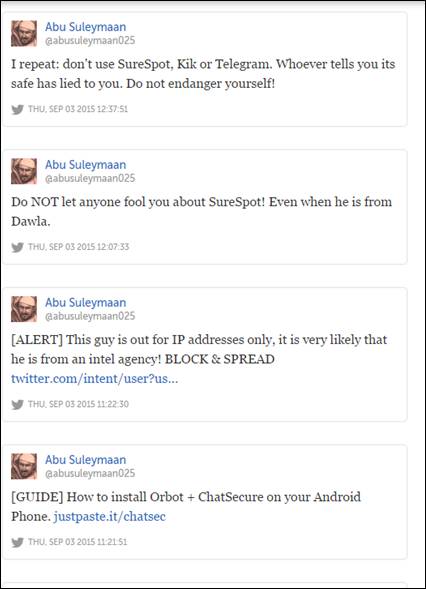
On September 16, 2015, Abu Suleymaan posted what appears to be the residential home address of Pamela Geller, sponsor of the “Draw the Prophet” cartoon contest in Garfield, Texas, and prominent anti-Islamist activist. He called on his followers to retweet and spread this information. Forty minutes later, he posted interior images of an apartment and directly asked Ms. Geller “when are you going to invite me for dinner?”


Abu Suleymaan, Twitter post, September 26, 2015, 8:54 p.m., https://twitter.com/WilayatNinawa/status/647937234960842752. Also on this day, he disseminated details of a Mohammed cartoon contest hosted by Stop Islamization of Europe held in Copenhagen, appealing to “Brothers from Denmark.”Abu Suleymaan, Twitter post, September 26, 2015, 9:02 a.m., https://twitter.com/WilayatNinawa/status/647758185764405248.

|
|
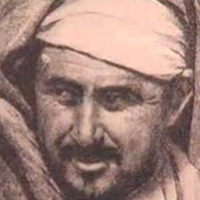
Azz Dine is a French-speaking propagandist for ISIS. The account holder implies that s/he lives in France, according to his/her Twitter bio.Battle of Fallujah, Twitter, accessed July 22, 2015, https://twitter.com/Azz10nee/. In posts, Azz Dine rails against ShiitesBattle of Fallujah, Twitter post, July 21, 2015, 5:32 a.m., https://twitter.com/Azz10nee/status/623470658094280704/; Battle of Fallujah, Twitter post, July 21, 2015, 3:05 a.m, https://twitter.com/Azz10nee/status/623433644179365888; Battle of Fallujah, Twitter post, July 21, 2015, 12:37 a.m, https://twitter.com/Azz10nee/status/623396339615928320; Battle of Fallujah, Twitter post, July 20, 2015, 11:44 p.m., https://twitter.com/Azz10nee/status/623382932498030592. and kuffar (nonbelievers).Battle of Fallujah, Twitter post, July 20, 2015, 11:51 p.m., https://twitter.com/Azz10nee/status/623384832253534208. The account holder has posted pro-ISIS tweets, including a photo of a young girl wearing a veil while on a swing. The caption reads, “The princesses of the Caliphate. When in the West, one teaches children that ‘nudity’ is a right.”Battle of Fallujah, Twitter post, July 20, 2015, 3:30 a.m., https://twitter.com/Azz10nee/status/623077598453755904.

Translation: “The princesses of the Caliphate. When in the West, one teaches children that ‘nudity’ is a right.”
In another post, Azz Dine posts a series of photos purportedly showing ISIS members visiting their wounded in a hospital. In an apparent effort to promote ISIS’s emphasis of religion over race, the caption reads, “These images are powerful.. Brothers visiting the battle-wounded. Islam does not have color in [the Islamic State].”Battle of Fallujah, Twitter post, July 21, 2015, 1:00 a.m., https://twitter.com/Azz10nee/status/623402096193339392.

Translation: “These images are powerful.. Brothers visiting the battle-wounded. Islam does not have color in [the Islamic State]...”
CEP has tracked the account’s meteoric rise on Twitter. Azz Dine’s @Azz10nee account quickly attracted a substantial following, garnering an average of 100+ followers per day from its first post on July 19, 2015, to July 22, 2015, only three days later.Battle of Fallujah, Twitter, accessed July 22, 2015, https://twitter.com/Azz10nee/. Twitter suspended the account by July 24, 2015, but reinstated the account by August 20, 2015. The @Azz10nee account appears to be run by the same person as Azz Dine (@JaiPasDide) as the two accounts published identical tweets simultaneously. Furthermore, on Battle of Fallujah’s first tweet under the reinstated @Azz10nee account, he referenced the @JaiPasDide account, and now goes by “Azz Dine” instead of the Arabic wording for “Battle of Fallujah.”

Translation: “Back after suspension”
- @Azz10neeBattle of Fallujah, Twitter, accessed July 22, 2015, https://twitter.com/Azz10nee/.
- @Azz10nee2Azz Dine, Twitter, accessed April 14, 2016, https://twitter.com/Azz10nee2.
- @JaiPasDideAzz Dine, Twitter, accessed August 19, 2015, https://twitter.com/JaiPasDide.
- Battle of FallujahBattle of Fallujah, Twitter post, July 20, 2015, 6:30 a.m., https://twitter.com/Azz10nee/status/623077598453755904; Azz Dine, Twitter post, July 20, 2015, 6:30 a.m., https://twitter.com/JaiPasDide/status/623077598453755904; Azz Dine, Twitter post, 4:00 a.m., https://twitter.com/JaiPasDide/status/623402096193339392; Battle of Fallujah, Twitter post, July 21, 2015, 4:00 a.m., https://twitter.com/Azz10nee/status/623402096193339392.
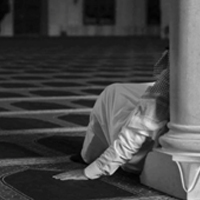
Twitter personality “Abu Hurayra al-Hindi” is a suspected recruiter for ISIS. Al-Hindi uses Twitter to promote his accounts on private messaging services Kik, Surespot, and Chatsecure, seemingly for recruitment purposes.Abu Hurayra Al-Hindi, Twitter post, August 2, 2015, 5:23 p.m., https://twitter.com/DexterText/status/627998188465713152;
Abu hurayra Al-Hindi, Twitter post, November 19, 2015, 1:48 p.m., https://twitter.com/alhindi_hhh/status/667414056010162177. Al-Hindi claims to live in ISIS-controlled territory and uses Twitter to advertise an idealized portrait of life under ISIS rule. He advocates for hijrah (migration) to ISIS-held territory, and is a self-proclaimed terrorist who aims to kill infidels.Abu Hurayra Al-Hindi, Twitter post, September 15, 2015, 5:39 p.m., https://twitter.com/TruthFulFamily3/status/643902026842304512.
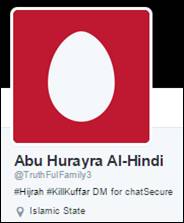
Al-Hindi’s profile description, in which he claims to live in ISIS-held territory, advocates for hijrah (migration) to ISIS-held territory, and advertises his private messaging account on Chatsecure. Al-Hindi also urges viewers to kill kuffar (pejorative for non-believers).
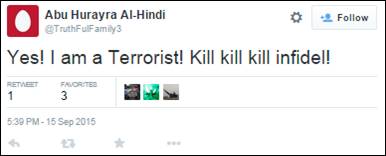
Al-Hindi uses Twitter to incite violence against infidels (pejorative for non-believers).
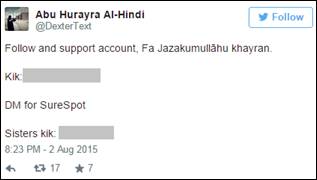
Al-Hindi’s Twitter account advertises accounts on encrypted messaging services Kik and Surespot.
Amidst advocating for migration to ISIS-held territory and mass murder against non-believers, Al-Hindi posts seemingly banal pictures of food, allegedly from his home in ISIS-held territory.Abu Hurayra Al-Hindi, Twitter post, September 15, 2015, 11:48 a.m., https://twitter.com/TruthFulFamily3/status/643813644757811200.

Al-Hindi posts banal image of food in an apparent effort to appeal to average Twitter users.
In September 2015, al-Hindi created an Instagram account, although the account remains inactive as of October 2015. Abu Hurayra Al-Hindi, Twitter post, September 11, 2015, 8:37 p.m., https://twitter.com/TruthFulFamily3/status/642497186526269440; truthfulfamily, Instagram, accessed October 4, 2015, https://instagram.com/truthfulfamily.
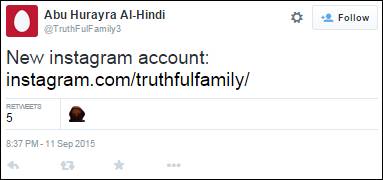
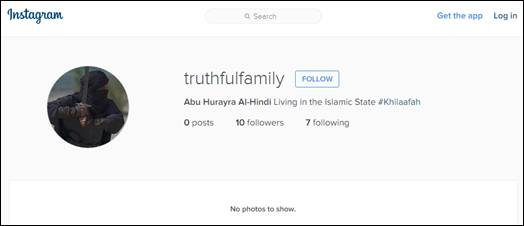
Abu Hurayra Al-Hindi’s Instagram account, created in September 2015 and inactive as of October 2015.
- @alhindi_hhhAbu hurayra Al-hindi, Twitter, accessed November 19, 2015, https://twitter.com/alhindi_hhh.
- @DexterTextAbu Hurayra Al-Hindi, Twitter, accessed August 3, 2015, https://twitter.com/DexterText.
- @TruthFulFamily3Abu Hurayra Al-Hindi, Twitter, accessed October 4, 2015, https://twitter.com/TruthFulFamily3.
- Al-Hindi al-afrikiAbu hurayra Al-hindi, Twitter, accessed November 19, 2015, https://twitter.com/alhindi_hhh.
- Abu hurayra Al-hindiAbu hurayra Al-hindi, Twitter, accessed November 19, 2015, https://twitter.com/alhindi_hhh.
- AbuHurayraZAAbu Hurayra Al-Hindi, Twitter, accessed August 3, 2015, https://twitter.com/DexterText.
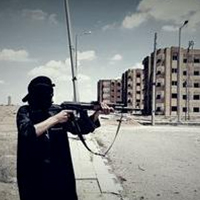
Twitter personality “Umm Jihad” (“Mother of Jihad”) is a propagandist, recruiter, and intimidator in support of ISIS. Umm Jihad tailors her message to her female following, urging them to migrate to ISIS-held territory or execute violent attacks at home. Through Twitter, she also seeks to intimidate those who might otherwise leak sensitive information to authorities.
Through Twitter posts, Umm Jihad encourages her followers to make hijrah (migration) to ISIS-held territory. This includes migration to ISIS’s headquarters in Syria and Iraq, as well as in the group’s wilayats (provinces) scattered throughout the world, particularly Nigeria. Umm Jihad tailors this message in particular to her female following, urging ukhts (sisters) to go to Syria if they want to live under sharia, or Nigeria if they want to execute a martyrdom operation. She particularly emphasizes Nigeria, saying, “it seems like Dawlah [ISIS’s “state”] in Nigeria does allow sisters to commit Martyrdom operations. Nigeria is my new fav place.”
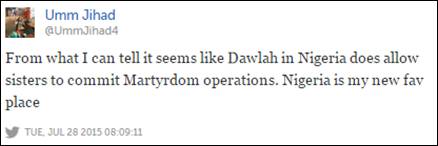

Unlike her message for female jihadists (to travel to Syria or Nigeria), Umm Jihad urges males to spread out and migrate to ISIS provinces around the world. As she says, “Brothers should be making hijrah to every country that has given bayah [pledged allegiance] to Dawlah [ISIS’s “state”]. Sisters should be making hijrah to Syria or Nigeria.”

Umm Jihad has also called for violent attacks, inciting her female audience in particular to “go forth and attack.”

Umm Jihad has used Twitter as a platform to bully captured jihadists or prospective “snitches” into silence, writing, “For those who ever get arrested or have gotten arrested there is one rule to live by: don’t snitch.” In successive messages, she writes, “When you get arrested the only info you give those kuffs [kuffar, nonbelievers] is general info things that they already know then you sit back and shut up… When you get arrested you better take the fall for everything. You mention no names, no dates, no times. NOTHING.”
In support of her message, Umm Jihad reveals some of her self-proclaimed personal history: “When I was arrested by Fateh [the Palestinian Authority] they spent hours, days, and months trying to get me to snitch on other Palestinians… and the only thing I told them was ‘I don’t know.’ because snitches and sell outs are not welcomed in Dawlah [ISIS’s “state”].”

- @UmmHeartLess15Umm Jihad, Twitter, accessed July 28, 2015, https://twitter.com/UmmJihad4.
- @UmmJihad4Umm Jihad, Twitter, accessed July 28, 2015, https://twitter.com/UmmJihad4.
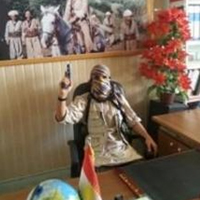
Stay up to date on our latest news.
Get the latest news on extremism and counter-extremism delivered to your inbox.